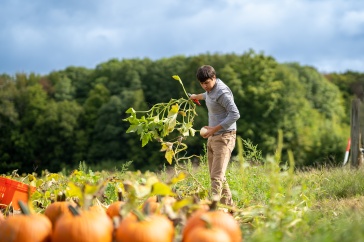
Shockwave, a new cantaloupe, is one of nine new UNH-developed cucurbit varieties now commercially available. (Courtesy photo)
Gardeners getting ready to plant their fruits and vegetables will have a number of new UNH-developed cantaloupes, pumpkins and acorn squash to choose from. Nine new cucurbit varieties created by Brent Loy, emeritus professor of plant genetics and NH Agricultural Experiment Station (NHAES) researcher, are now available from several seed suppliers.
Loy’s groundbreaking work represents the longest continuous squash and pumpkin breeding program in North America.
These latest varieties were developed to be well suited to state and regional growing conditions, have improved yields and exhibit disease and pest resistance. Loy and his team also have been focused on reducing farm inputs of pesticides and labor for weed control by incorporating better disease resistance into new varieties and developing varieties with a more compact and upright growth habit for better weed control through cultivation.
“Traditional breeding projects at the University of New Hampshire have been highly successful in developing new varieties of melon, ornamental pumpkin, winter squash, summer squash and gourds, which enhance the capacity of farmers to provide a diversity of produce at local markets such as roadside stands, farmers markets and related retail markets,” Loy says.
Loy’s experiment station-funded work, which has largely taken place at the NHAES Kingman Farm, has resulted in more than 70 new varieties of squash, pumpkins, gourds and melons sold in seed catalogs throughout the world, many of the varieties being joint developments with seed companies located in the Northeast.

“Development of new varieties has been a key underpinning for production of abundant and nutritious vegetables in North America. With increasing land prices and increased costs associated with inputs such as fertilizers, pesticides and labor, improved variety performance in terms of yield, quality and ease of culture is paramount to successful farming,” he says. “Moreover, income generated by regional seed companies in producing and marketing locally adapted varieties helps maintain their profitability.”
Two new cantaloupe varieties are available to home gardeners. First Kiss is an early cantaloupe with medium size fruits available from High Mowing Seeds. Shockwave, a long shelf-life cantaloupe with higher sugar content than most varieties is available from Holmes Seed Co. and Harris Seeds.
Pumpkin lovers have several relatively new types of pumpkin to consider for planting. Naked Bear is a hull-less seeded pumpkin with small fruit, high seed yields, good tip fill, semi-bush growth habit, tolerance to bacterial leaf spot disease and intermediate resistance to powdery mildew disease. Designed for snack seed production, it is available from Holmes Seed Co. and Harris Seeds.
Two new white pumpkins are Blanco and Snowball, and both are noted for retaining their white rinds well. Blanco, a four to five-pound pumpkin, was developed in a cooperative effort with Seneca Vegetable Research. It is available from Harris Seeds, Jordan Seeds and Stokes Seeds. Snowball, a small, round pumpkin, was developed in a collaborative effort with Hybrid Seeds of New Zealand and is available from Johnny’s Selected Seeds. A new yellow pumpkin variety, Sunlight, is in the pie pumpkin class, and is especially attractive when marketed next to white pumpkins. Available from Johnny’s Selected Seeds, it also has tolerance to powdery mildew disease.
Moonshine

The first white pumpkin released from UNH breeding, Moonshine, has been lighting up pumpkin patches since 2013.
Three varieties of acorn squash with higher starch content and improved eating quality as compared to most standard varieties also have been released. Honey Bear is a small acorn variety with very compact bush growth, available from Johnny’s Selected Seeds. Sugar Bear, a slightly larger acorn variety is available from High Mowing Organic Seeds, as is Sugar Dumpling, a small, striped acorn type squash. All three varieties have powdery mildew resistance.
This breeding research is based upon work supported by the NH Agricultural Experiment Station, through joint funding of the National Institute of Food and Agriculture, U.S. Department of Agriculture, under award number 233554, and the state of New Hampshire.
-
Written By:
Lori Tyler Gula, PhD | NH Agricultural Experiment Station | lori.gula@unh.edu | 603-862-1452



















































